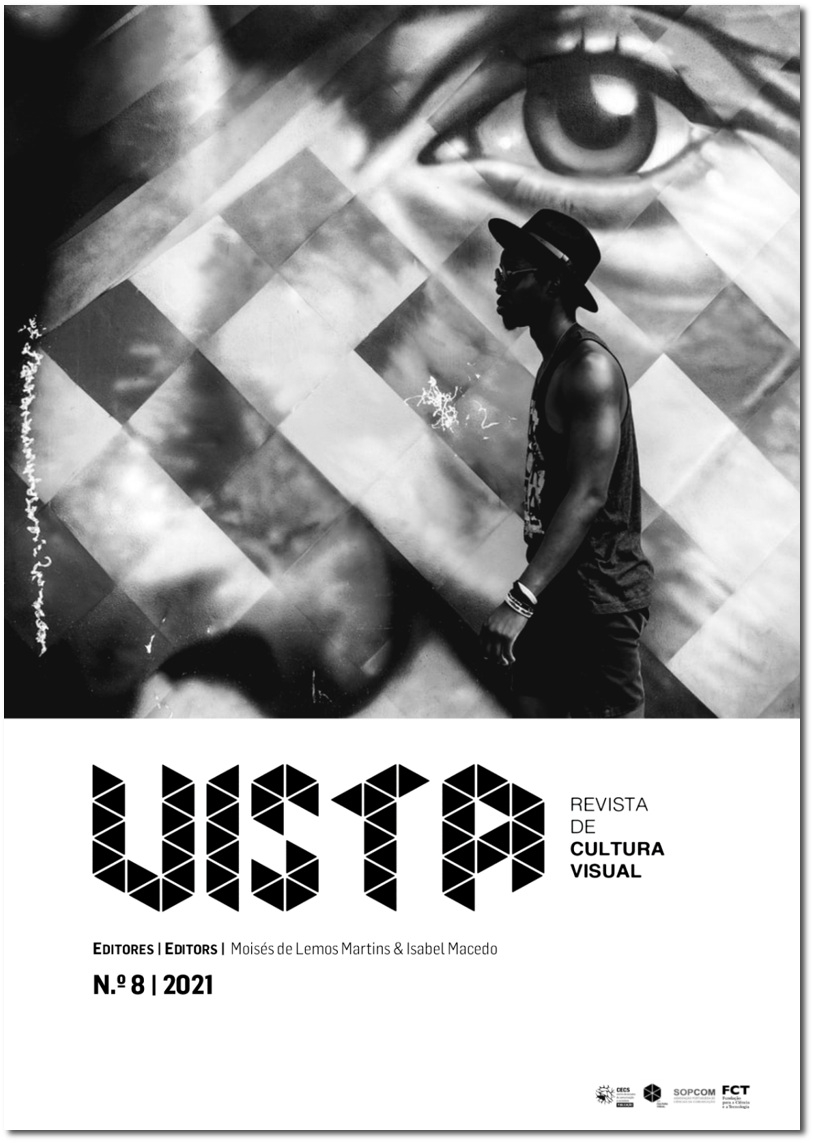Our Ghosts Have Come to Collect: Decolonial Turn in Contemporary Brazilian Art
DOI:
https://doi.org/10.21814/vista.3641Keywords:
decolonial, contemporary art, BrazilAbstract
This text expands, deepens and comments on the essay “As Práticas Artísticas Contemporâneas no Contexto Ibero-Americano e o Pensamento Pós-Colonial e Decolonial” (Contemporary Artistic Practices in the Ibero-American Context and Postcolonial and Decolonial Thought; Sales & Cabrera, 2020), where we comment on the work of the artists Yonamine, Grada Kilomba, Jota Mombaça, and Daniela Ortiz. In the text cited, we work on the problematic discussion around the emergence of a field of thought called “post-colonial” and a decolonial project and how poetic practices interested in the discussion around the colonial legacy are configured in the Ibero-American space. From a historical approach, we try to understand how postcolonial studies produce influence in Brazil and the decolonial turn and thought consolidated in Latin America to understand how to produce responses from the Brazilian art field to decolonization issues. In postcolonial studies and the decolonial project, the decolonization of art is related to the questioning of a Eurocentric thought matrix from its racialized and subalternized world representation schemes deeply related to the performative character of the one who narrates. In other words, the decolonization of art and thought, and the ways of being and existing in the world, are not dissociated from the emergence of artists, writers, and intellectuals. These intellectuals dispute the right to self-representation, self-presentation, and the creation of non-colonial narratives and images or those who stand completely outside the Eurocentric imaginary and worldview. This text establishes a deep interest in the Brazilian context, appropriating the important discussion around the constitution of a decolonial field of thought, analyzing the work of contemporary Brazilian artists such as Jota Mombaça, Juliana Notari, Michelle Mattiuzzi, and Paulo Nazareth.
Downloads
References
África nas Artes. (2018a, 2 de outubro). [Parte 4] Língua bifurcada [Vídeo]. YouTube. https://www.youtube.com/watch?v=j_EwTemsK8Q
África nas Artes. (2018b, 2 de outubro). [Parte 1] Autodefinição [Vídeo]. YouTube. https://www.youtube.com/watch?v=vztLJfJYPYs
Ballestrin, L. (2013). América Latina e o giro decolonial. Revista Brasileira de Ciência Política, (11), 89–117. https://doi.org/10.1590/S0103-33522013000200004
Gilroy, P. (1993). The black Atlantic: Modernity and double consciousness. Harvard University Press.
Gonzalez, L. (1984). Racismo e sexismo na cultura brasileira. Revista Ciências Sociais Hoje, 223–244.
Guzzo, M., & Taddei, R. (2019). Experiência estética e antropoceno. Políticas do comum para os fins de mundo. Desigualdade & Diversidade, (17), 72–88. https://doi.org/10.17771/PUCRio.DDCIS.46021
Kilomba, G. (2019). Memórias da plantação. Episódios de um racismo cotidiano. Cobogó.
Maldonado-Torres, N. (2008). A topologia do ser e a geopolítica do conhecimento. Modernidade, império e colonialidade. Revista Crítica de Ciências Sociais, (80), 71–114. https://doi.org/10.4000/rccs.695
Mbembe, A. (2017). Crítica da razão negra (M. Lança, Trad.). Antígona. (Trabalho original publicado em 2013)
Mignolo, W. D. (2010). Decolonial aesthesis. Calle 14, 4(4), 13–25.
Mignolo, W. D. (2017). Colonialidade: O lado mais escuro da Modernidade (M. Oliveira, Trad.). Revista Brasileira de Ciências Sociais, 32(94), 1–17. https://doi.org/10.17666/329402/2017 (Trabalho original publicado em 2011)
Mombaça, J. (2015). Pode um cu mestiço falar? Medium. https://medium.com/@jotamombaca/pode-um-cu-mestico-falar-e915ed9c61ee
Mombaça, J. (2016). Rumo a uma redistribuição desobediente de gênero e anticolonial da violência! Fundação Bienal de São Paulo.
Quijano, A. (1997). Colonialidad de poder, cultura y conocimiento en América Latina. Anuario Mariáteguiano, 9(9), 113–122.
Ribeiro, D. (2017). O que é lugar de fala? Letramento.
Sales, M., & Cabrera, J. (2020). As práticas artísticas contemporâneas no contexto ibero-americano e o pensamento pós-colonial e decolonial. Incomum, 1(1), 1–24.
Sales, M., & Costa, P. (Eds.). (2019). Estéticas especulativas decoloniais [Dossier temático]. Vazantes, 3(1).
Shohat, E., & Stam, R. (2006). Crítica da imagem eurocêntrica: Multiculturalismo e representação (M. Soares, Trad.). Cozac Naify. (Trabalho original publicado em 1994)
Silva, D. F. da. (2020). Ler a arte como confronto (M. Sales, F. Gonçalves, & D. Meirinho, Trads.). LOGOS, 7(3). https://doi.org/10.12957/logos.2020.57382 (Trabalho original publicado em 2015)
Spivak, G. C. (1988). Can the subaltern speak? In C. Nelson & L. Grossberg (Eds.), Marxism and the interpretation of culture (pp. 271–313). University of Illinois Press.
Veras, L. (2020). Juliana Notari: Catarse e liberdade. Continente. https://www.revistacontinente.com.br/edicoes/225/juliana-notari
Downloads
Published
How to Cite
Issue
Section
License
Copyright (c) 2021 Michelle Sales

This work is licensed under a Creative Commons Attribution 4.0 International License.
Authors own the copyright, providing the journal with the right of first publication. The work is licensed under a Creative Commons Attribution 4.0 International License.













